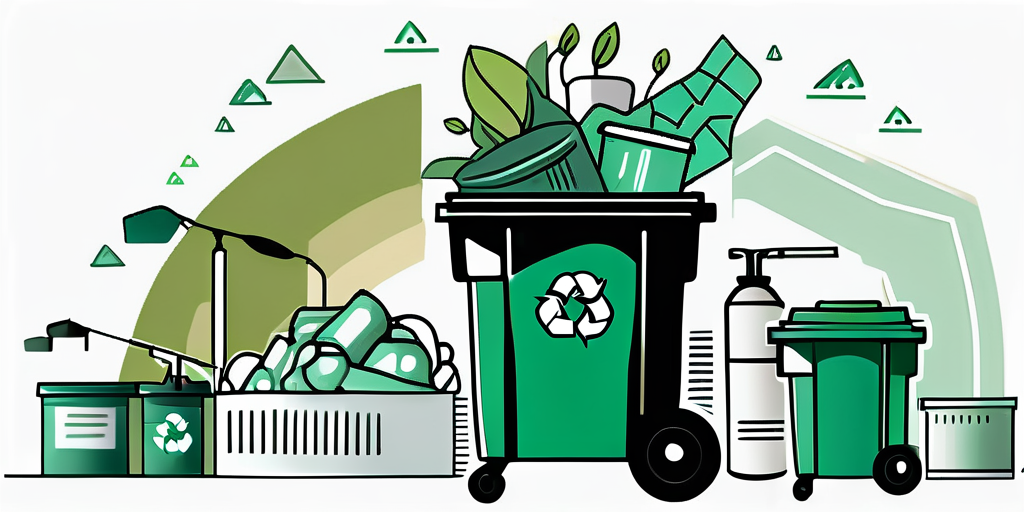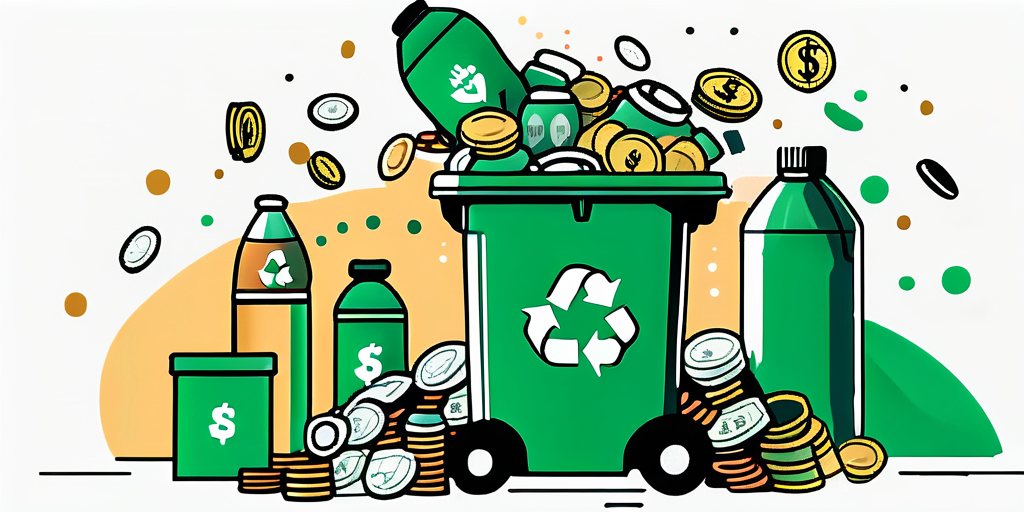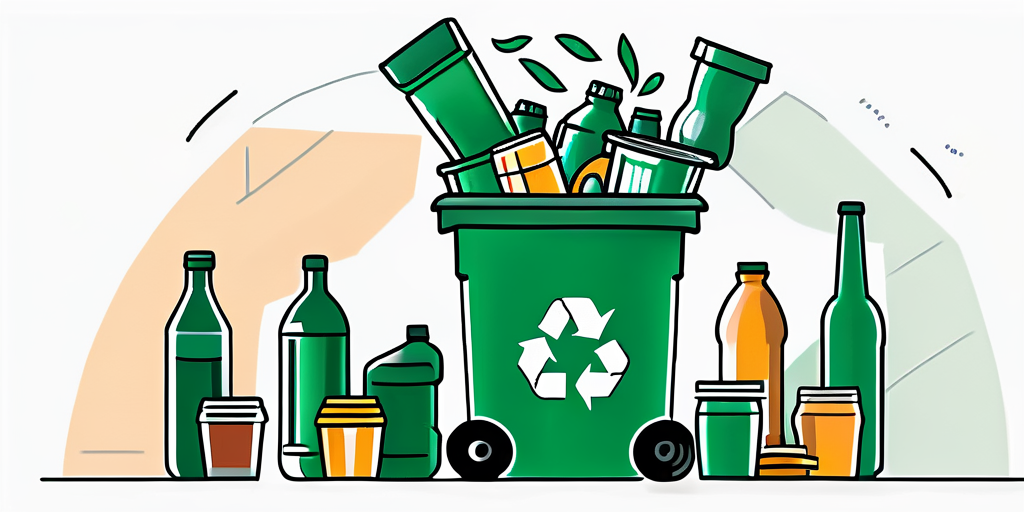
How Does Recycling Save Money? Uncover the Financial Benefits
In today’s world, where both individuals and businesses are constantly trying to find ways to save money, recycling has emerged as an effective solution. Not only does recycling help protect the environment, but it also offers a range of financial benefits. By reducing waste, conserving resources, and implementing innovative recycling initiatives, both individuals and businesses can reap the rewards of cost savings and even drive financial growth.
The Economic Impact of Recycling
Recycling has a significant economic impact, both locally and globally. By diverting waste from landfills, recycling reduces the need for costly landfill expansion and maintenance. The savings from these avoided expenses can be reinvested into essential community services or infrastructure development. Moreover, recycling creates jobs in sectors such as collection, sorting, and processing, contributing to economic growth and stability.
Furthermore, recycling reduces the demand for raw materials, which in turn, can lead to lower manufacturing costs. By utilizing recycled materials, businesses can save on production expenses, making their products more cost-effective. These lower costs can then be passed on to consumers, ensuring a win-win situation for both businesses and customers.
Another important aspect of the economic impact of recycling is the potential for innovation and entrepreneurship. As the demand for recycled materials increases, there is a growing opportunity for businesses to develop new technologies and processes to efficiently recycle various materials. This not only leads to job creation in the research and development sector but also fosters a culture of innovation within the recycling industry.
Moreover, the environmental benefits of recycling can have long-term economic advantages. By reducing pollution and conserving natural resources, recycling helps to mitigate the costs associated with environmental damage. This can lead to savings in healthcare expenses due to improved air and water quality, as well as reduced expenses related to disaster recovery and cleanup efforts.
Cost Savings Through Waste Reduction
One of the primary ways recycling saves money is by reducing waste. When individuals and businesses recycle, they minimize the amount of waste that enters the waste stream. This directly translates into lower waste management costs, including disposal fees and transportation expenses. By diverting waste from landfills, recycling reduces the burden on waste management systems, ultimately leading to cost savings.
Additionally, recycling reduces the need for the extraction and processing of raw materials. Extracting virgin materials requires significant investment in machinery, labor, and energy. By utilizing recycled materials instead, businesses can save on these extraction costs, resulting in substantial savings in the long run.
Moreover, recycling plays a crucial role in conserving natural resources and protecting the environment. When materials are recycled and reused, it reduces the demand for new resources to be extracted from the earth. This helps in preserving forests, reducing water consumption, and lowering greenhouse gas emissions associated with resource extraction and manufacturing processes. By promoting a circular economy where materials are reused and recycled, we can mitigate the environmental impact of resource depletion and contribute to a more sustainable future for generations to come.
Recycling’s Role in Resource Conservation
Recycling plays a vital role in conserving valuable resources. Many materials, such as metals, plastics, and paper, can be recycled and transformed into new products. By recycling these materials, we avoid the need for extracting new resources, which not only conserves their availability but also saves money.
For instance, recycling aluminum cans saves a tremendous amount of energy compared to producing new cans from raw materials. The energy saved can translate into significant cost savings for both manufacturers and consumers. Similarly, recycling paper saves trees, water, and energy, reducing the costs associated with logging and processing virgin paper.
Moreover, recycling helps in reducing greenhouse gas emissions. When materials are recycled, the amount of waste sent to landfills decreases, which in turn reduces the production of methane, a potent greenhouse gas emitted during the decomposition of organic waste in landfills. By diverting waste from landfills through recycling, we can mitigate the impact of climate change and contribute to a healthier environment.
Additionally, recycling plays a crucial role in conserving water resources. The process of recycling materials like plastics and paper requires less water compared to producing these materials from raw resources. By recycling, we can help alleviate the strain on water sources, especially in regions facing water scarcity, and promote sustainable water management practices.
Analyzing the Financial Incentives of Recycling Programs
Many municipalities and organizations offer financial incentives to encourage recycling. These incentives can significantly offset the costs associated with recycling, making it a financially viable option for individuals and businesses. Some of the common financial incentives include reduced waste collection fees, tax credits or deductions, and grants for implementing recycling initiatives.
For example, some local governments offer rebates or tax incentives to businesses that invest in recycling infrastructure and equipment. These financial incentives not only help businesses recoup their initial investments but can also lead to long-term cost savings by reducing waste management expenses.
In addition to direct financial incentives, some recycling programs also offer non-monetary rewards such as recognition and certification for sustainable practices. Businesses that participate in these programs may receive certifications that can enhance their reputation and attract environmentally conscious customers. This can result in increased brand loyalty and positive word-of-mouth marketing, further boosting the business’s bottom line.
Furthermore, recycling initiatives can have a positive impact on the local economy by creating jobs in the recycling and waste management sectors. As more individuals and businesses participate in recycling programs, the demand for recycling services and facilities increases, leading to job creation and economic growth. This ripple effect can strengthen the community’s overall financial health and sustainability.
Case Studies: Businesses Profiting from Recycling Initiatives
Several businesses have successfully implemented recycling initiatives and profited from their efforts. These case studies serve as inspiring examples of how recycling can drive financial growth. For instance, a major beverage company implemented a bottle-to-bottle recycling program, where they collected and recycled used bottles into new ones. The program not only saved the company millions of dollars in raw material costs but also enhanced their brand image as an environmentally responsible company, attracting more customers.

Another example is a manufacturing company that recycled its scrap metal instead of selling it. By implementing an in-house recycling program, they were able to reduce waste disposal costs and generate additional revenue by selling recycled metal as a valuable resource. These success stories demonstrate that recycling is not only an environmentally friendly choice but also a financially savvy one.
In addition to the financial benefits, businesses that embrace recycling initiatives often experience improved employee morale and engagement. When employees see their company taking proactive steps towards sustainability, it can boost their pride in their workplace and create a sense of purpose beyond just the bottom line. This, in turn, can lead to higher retention rates and increased productivity, ultimately benefiting the company’s overall performance.
Furthermore, recycling initiatives can also open up new partnership opportunities for businesses. Collaborating with recycling facilities, environmental organizations, or other eco-conscious companies can not only enhance a business’s reputation but also create a network of like-minded partners who are dedicated to making a positive impact on the environment. These partnerships can lead to shared resources, knowledge exchange, and even joint marketing efforts that amplify the reach and effectiveness of recycling initiatives.
Government Policies and Financial Benefits of Recycling
Government policies play a crucial role in promoting and incentivizing recycling. Many governments worldwide have implemented policies that require or encourage recycling, creating a supportive environment for businesses and individuals. These policies often come with financial benefits such as tax breaks, grants, and subsidies for recycling initiatives.
Furthermore, governments recognize the financial benefits of recycling through cost savings on landfill management and reduced healthcare costs associated with pollution and waste. By diverting waste from landfills, governments can mitigate the environmental and financial impacts of waste disposal, which ultimately contributes to overall economic stability.
Moreover, some governments have introduced innovative programs to further boost recycling efforts. For example, certain countries offer deposit return schemes where consumers receive a refund for returning recyclable containers. This not only encourages individuals to recycle but also creates a circular economy where materials are reused efficiently.
In addition to financial benefits, recycling also plays a significant role in job creation. The recycling industry requires a diverse workforce ranging from collection and sorting to processing and manufacturing. As recycling rates increase, so does the demand for skilled and unskilled labor in various sectors, providing employment opportunities and stimulating economic growth.
The Circular Economy: A Sustainable Approach to Cost Savings
Recycling is a fundamental component of the circular economy, a sustainable economic model that aims to minimize waste and maximize resource efficiency. In the circular economy, materials are recycled and reused in a closed-loop system, reducing the need for extracting new resources and minimizing waste generation.
Embracing the circular economy principles not only benefits the environment but also offers numerous financial advantages to businesses. By adopting a circular approach, companies can tap into a plethora of cost-saving opportunities beyond just material reuse. For instance, implementing product design strategies that prioritize durability and reparability can result in longer-lasting products, reducing the frequency of replacements and ultimately cutting down on production costs.
Furthermore, the circular economy encourages innovative business models such as product-as-a-service and sharing platforms, which can open up new revenue streams while promoting resource efficiency. These models allow customers to access products as services, shifting the focus from ownership to access and utilization. As a result, businesses can optimize the use of resources, minimize waste, and create a more sustainable and profitable operation in the long run.
Calculating the Return on Investment for Recycling Efforts
Measuring the return on investment (ROI) for recycling initiatives is essential for businesses to understand the financial impact of their efforts. While it may seem challenging to quantify the financial benefits of recycling, various metrics can help assess the cost savings and revenue generation resulting from recycling.

For example, businesses can calculate the cost savings from reduced waste disposal fees, avoided landfill expansion costs, and decreased raw material expenses. Additionally, they can track the revenue generated from selling recycled materials or the potential increase in customer loyalty due to their environmentally conscious practices. By analyzing these metrics, businesses can determine the financial viability of their recycling initiatives and make informed decisions regarding further investments.
Moreover, beyond the direct financial gains, investing in recycling initiatives can have long-term benefits for businesses. By adopting sustainable practices, companies can enhance their brand image and reputation, attracting environmentally conscious consumers and investors. This positive brand association can lead to increased market share and competitiveness in the industry.
Furthermore, recycling efforts can contribute to a reduction in greenhouse gas emissions and energy consumption, aligning businesses with global sustainability goals and regulations. This alignment not only demonstrates corporate social responsibility but also positions companies as leaders in environmental stewardship, fostering partnerships with like-minded organizations and government entities.
Green Innovation: How Recycling Drives Financial Growth
Recycling not only saves money through cost reductions but also drives financial growth through green innovation. As businesses and individuals strive to adopt more sustainable practices, recycling initiatives can spur innovation and create new revenue streams.
For instance, companies specializing in recycling technologies and equipment are emerging as key players in the green economy. By developing innovative recycling technologies, they provide businesses with efficient and cost-effective solutions for recycling various materials. This not only helps businesses save money but also positions them as leaders in the sustainability space, attracting environmentally conscious customers.
Moreover, the concept of a circular economy, where resources are reused and recycled continuously, is gaining traction. This shift towards a circular model not only reduces waste but also fosters economic growth by creating a closed-loop system that minimizes the need for raw materials. As more industries embrace this approach, they are discovering new opportunities for innovation and collaboration.
Additionally, governments around the world are implementing policies to incentivize recycling and promote sustainable practices. Through initiatives such as extended producer responsibility (EPR) programs and tax incentives for eco-friendly businesses, policymakers are encouraging companies to invest in recycling infrastructure and technology. These measures not only benefit the environment but also stimulate job creation and drive economic development.
Tips for Individuals and Businesses to Maximize Savings through Recycling
To maximize the financial benefits of recycling, both individuals and businesses can take several steps:
- Implement a comprehensive recycling program that encompasses all recyclable materials.
- Reduce waste generation through mindful consumption and sustainable practices.
- Collaborate with recycling partners to ensure proper collection, sorting, and processing.
- Explore government incentives and grants to offset the costs of recycling initiatives.
- Engage employees and customers in recycling efforts through education and awareness campaigns.
- Continuously evaluate the financial impact of recycling efforts and make necessary adjustments.
By following these tips, individuals and businesses can not only contribute to a more sustainable future but also uncover the significant financial benefits that recycling offers.
Moreover, it’s essential to stay updated on the latest recycling technologies and innovations to optimize the recycling process further. Investing in state-of-the-art recycling machinery and equipment can streamline operations, increase efficiency, and enhance cost-effectiveness in the long run.
Additionally, fostering partnerships with local schools, community organizations, and environmental groups can create a network of support for recycling initiatives. Collaborating with these entities can lead to shared resources, knowledge exchange, and increased community engagement, ultimately amplifying the impact of recycling efforts.
Conclusion
Recycling is a wise investment that offers both environmental and financial benefits. By reducing waste, conserving resources, and embracing green innovation, individuals and businesses can save money, drive financial growth, and support a more sustainable economy. From cost savings through waste reduction to government incentives and the circular economy, the financial advantages of recycling are numerous and diverse. By taking proactive steps and maximizing the potential of recycling, individuals and businesses can truly uncover the financial benefits and contribute to a greener, more prosperous future.


